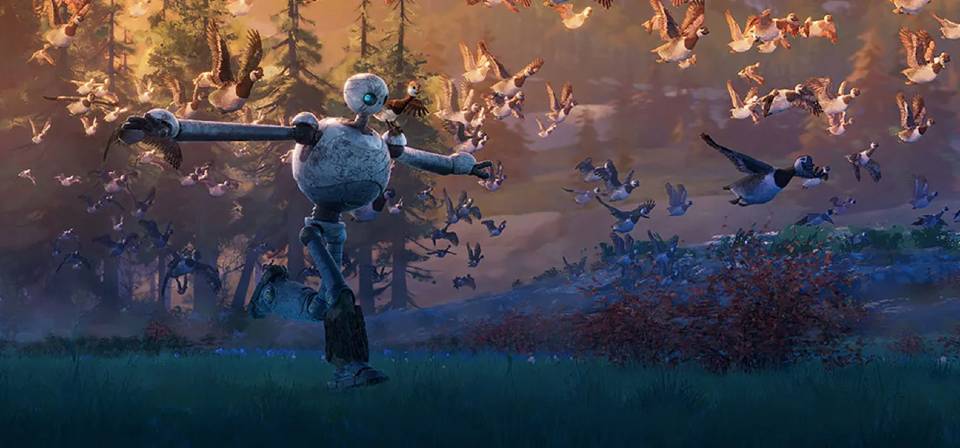Reviews

The Wild Robot (2024)
Watching Chris Sanders’s The Wild Robot, I felt things I haven’t felt in a very long time watching a Hollywood animated movie outside the Spider-Verse: wonder, discovery, joy.

Jurassic World Dominion (2022)
The word “dominion” is uttered once in Jurassic World Dominion, in an oblique, irreverent allusion to Genesis 1. “Not only do we lack dominion over nature, we are subordinate to it,” asserts Dr. Ian Malcolm (Jeff Goldblum) in one of his trademark, smugly iconoclastic epigrams. Later in the same speech, though, Malcolm turns with surprising optimism to the power of genetic science to shape the future. Does he really believe this? Is this speech coherent? Is the film itself coherent?

Top Gun: Maverick (2022)
Top Gun: Maverick is more than a nostalgia sequel or legacyquel; it is almost more than a movie. It is a manifesto and a monument, a defiant time capsule and a swaggering IMAX spectacle without precedent or peer.

Doctor Strange in the Multiverse of Madness (2022)
I’m thinking of a moment in the original movie in which Stephen looks skeptically at a deeply corrupted individual nattering about the greater good and retorts, “No. I mean, come on — look at your face.” Nobody says that in the sequel, but they should.

Cyrano (2021)
Dinklage swaggers and glowers magnificently and sings decently, but he’s at his best in quiet, intimate moments, especially with Roxanne and with his confidante Le Bret, the only one who sees his pain.

Spider-Man: No Way Home (2021)
Not so long ago, a movie like John Watts’ Spider-Man: No Way Home would definitely have prompted me to open my review by dubbing it, if not the best Spider-Man movie ever, at any rate the most Spider-Man movie ever.

The Tragedy of Macbeth (2021)
Fog and mist, translucent pavilion sidewalls, blowing curtains, dark water, shadows, reflections: the film is full of motifs evoking the murkiness in which Macbeth’s last days play out.

King Richard (2021)
As rousing sports films and inspirational biopics go, while King Richard is far from a pitiless, warts-and-all inquiry, it has a particular kind of truthfulness, analogous to the truthfulness of a family scrapbook or stories recounted at family reunions.

Dune: Part One (2021)
Watching Dune drove home to me the extent to which no one in 2021 can really go into an adaptation of Dune completely cold.

Jungle Cruise (2021)
Dwayne Johnson and Emily Blunt are highly watchable, but Disney’s latest theme-park movie trails haplessly in the wake of Pirates of the Caribbean without a ghost of its inspiration.

Black Widow (2021)
If it took a full-on case of amnesia to put Jason Bourne on the path to redemption, how do you redeem a Black Widow?

Luca (2021)
In Pixar’s Luca, a gentle, overtly Miyazaki-esque coming-of-age period piece struggles under the heavy weight of iron-clad Disney/Pixar formula requirements and story beats. The charming elements work well enough to carry the film, but only just.

A Quiet Place Part II (2021)
There are day-to-day crises and traumas that are somehow absorbed into the continuity of our lives, and then there are inexorable turning points that divide our lives into “before” and “after.”

The Mitchells vs. the Machines (2021)
In some ways The Mitchells vs. the Machines harks back to Cloudy With a Chance of Meatballs. Most obviously, it’s another goofy, rollicking techno-apocalypse centered on a bumpy parent-child relationship between an awkward, gifted youngster and a handy but technophobic dad.

Resurrection (2021)
The Bible world of Roma Downey and Mark Burnett’s LightWorkers Media productions sometimes seems not unlike a movie about Shakespeare in which you hear lines like “To be or not to be, that is the question” and “All the world’s a stage, and all the men and women merely players,” but everyone seems to have heard them already.

Raya and the Last Dragon (2021)
If Disney’s Raya and the Last Dragon seems familiar, that might be because … well, because of echoes of a lot of things, really.

Wonder Woman 1984 (2020)
Wonder Woman 1984 is bonkers in a way that superhero movies these days don’t have the nerve to be.

Soul (2020)
Pete Docter’s Soul is Pixar’s third straight original feature, following Coco and Onward, that is explicitly about death, finality, and, in some way, what lies beyond.

Mulan (2020)
At this point it seems pretty clear that the kiss of death, creatively speaking, for Disney’s new line of live-action/CGI remakes is a Broadway musical.

Fátima (2020)
Marco Pontecorvo’s Fátima is the first screen version of the Marian apparitions at Fátima and the “Miracle of the Sun” I’ve seen that feels like the characters are living through the story’s events in the present tense.
Recent
Home Video
Copyright © 2000– Steven D. Greydanus. All rights reserved.